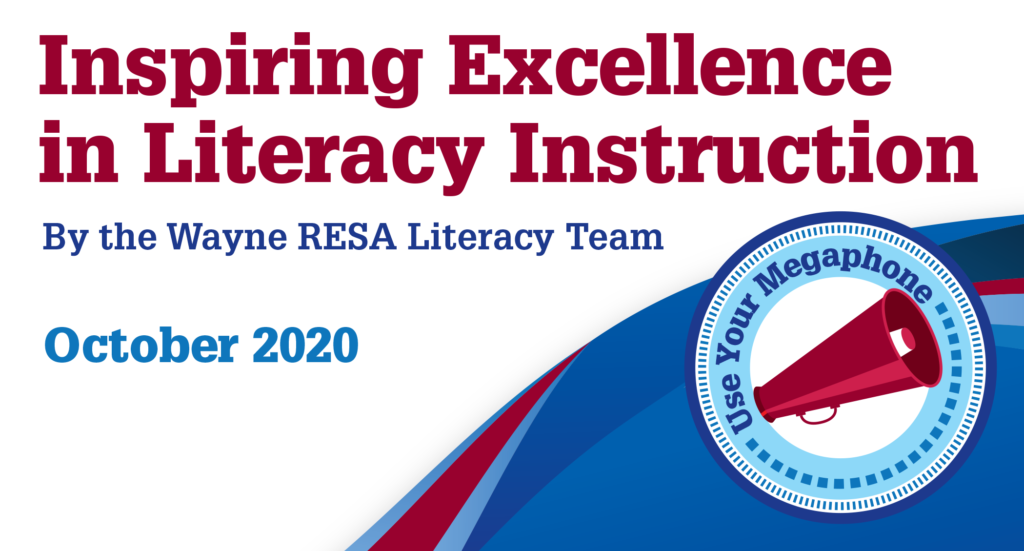
This newsletter has been created by Wayne RESA literacy consultants for literacy educators. In each issue, you will find Literacy Learning Network updates and information, statewide initiative updates, book synopses, teaching and coaching strategies, and upcoming professional learning opportunities. We look forward to partnering with you as we engage in best practices in literacy instruction for all students.
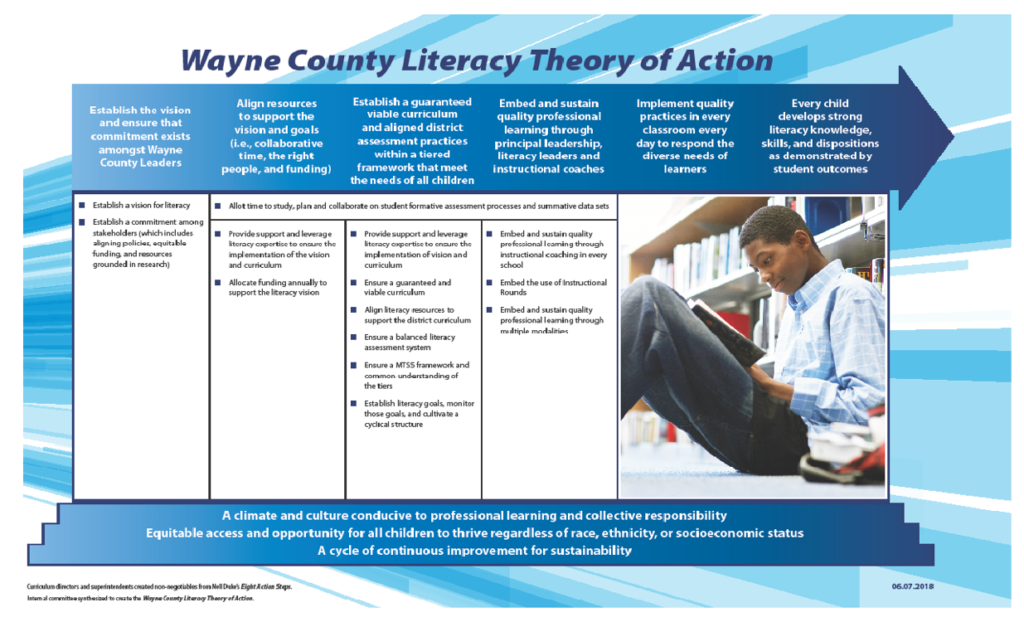
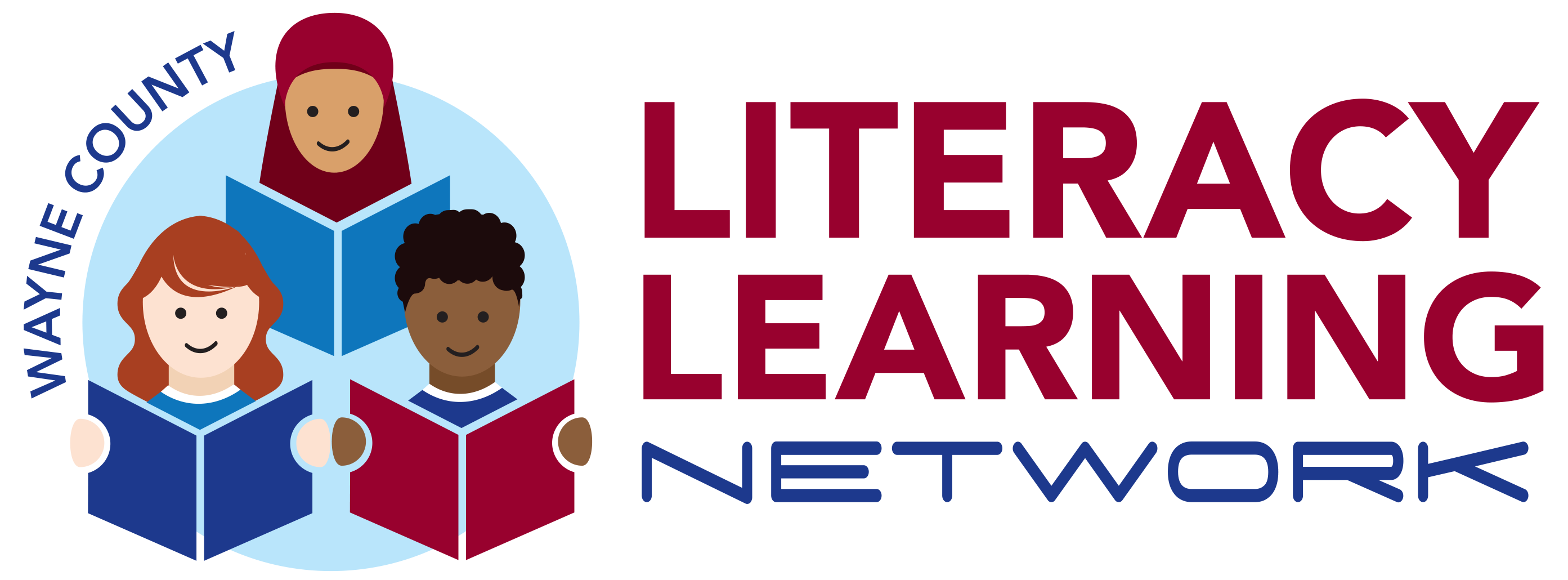
Updates
Equity-Focused Literacy Series
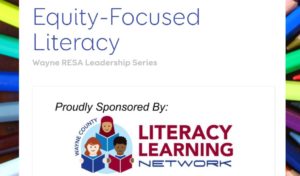
Beginning with a three-day session led by Dr. Gholdy Muhammad, this series features nationally recognized speakers, including Joe Feldman, Dr. Yolanda Sealy-Ruiz, Dr. Bryan Brown, Dr. Julia Aguirre, and Julie Torres. Spanning all grade levels and content areas, these workshops will explore instruction and assessment in an effort to “restore equity and excellence in today’s classrooms.” The Equity-Focused Literacy Series expands on the foundational definition of equity pedagogy developed by the Southeastern Michigan Equity Coalition (2020) that urges educators to “cultivate classroom environments and implement teacher practices that affirm students’ humanity, sustain their joy, and cultivate their brilliance, especially those who have been harmed in school and society.”
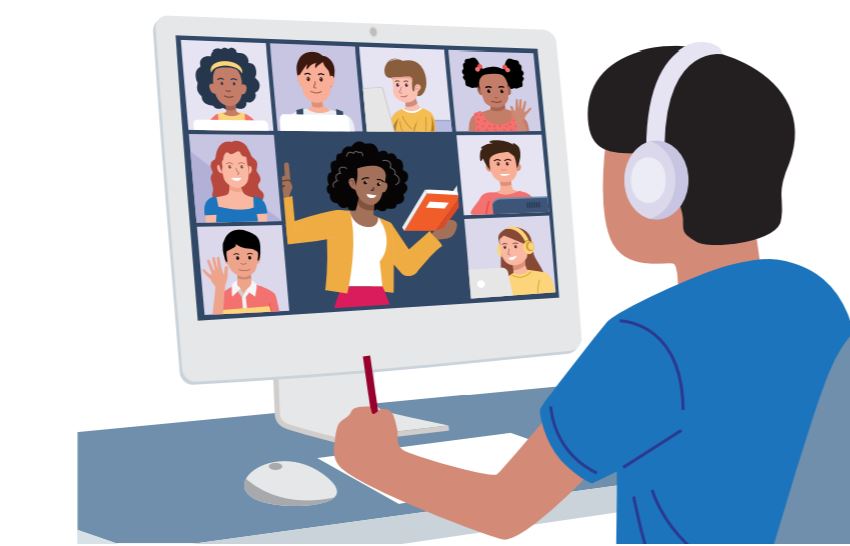
Remote Learning in Action Series
Our twenty-four-day Summer Learning Blitz provided professional learning for over 3,000 participants from nine Michigan counties. The resulting videos have been viewed and reviewed by educators eager to enhance their remote teaching practices. Building upon the thoughtful conversations generated by the summer sessions, the Literacy Learning Network is offering two Remote Learning in Action Series. The first, Remote Learning in Action: Interactive Networking, will examine high-leverage instructional practices that include inquiry, small-group instruction, effective feedback, interactive read-alouds, and more. Remote Learning in Action: Engagement and Classroom Management Strategies seeks to provide participants with a variety of techniques to engage students, build community, and set expectations in remote settings. All sessions are free of cost and are designed to further develop our shared expertise.
Statewide Updates
| Remote learning resources for the Essential Instructional Practices in Early Literacy are available on the Literacy Essentials site. Several videos from leading literacy educators, including Dr. Nell Duke and Dr. Heidi Anne Mesmer, equip educators with tools for teaching in remote settings. |
| The GELN Continuity of Learning Task Force has created Asynchronous Professional Learning Maps. Within the catalog, professional learning modules and webinars are coded according to the following categories: Remote Teaching and Learning, Well-Being, and Equity. In addition, the Maps include a link to free asynchronous modules offered by a variety of professional organizations. Both resources will be updated as additional professional learning offerings are made available. |
| The Michigan eLibrary (MeL) has a wide range of free eResources to support teaching and learning at all levels. The eBook K-8 Collection is an ideal resource for both virtual and face-to-face learning. For simple retrieval, permalinks can be copied and pasted directly into learning management systems, such as Google Classroom. Additionally, virtual bookbags are easy to create by organizing permalinks; for examples, see the Virtual Bookbag K-3 Science and Virtual Bookbag K-3 Social Studies. Finally, the Professional Learning page on the Literacy Learning Network site includes two recorded sessions about using MeL, and MeL Specialists can be consulted for additional training. |
| On November 12 from 9:00 am – 3:00 pm, the Michigan ASCD will be hosting Building Equity: A Virtual Symposium. The cost is $165 or $145 per participant for teams of three or more. Keynote speakers include Nancy Frey and Dominique Smith. Don’t miss this incredible opportunity! |
| For the 2020-2021 academic year, districts have created COVID-19 preparedness and response plans which will identify modes of instruction for students learning at a distance, in-person, or a hybrid of the two. Regardless of the mode of instruction, districts are required to meet the two assessment-related requirements of the Read by Grade Three (RBG3) law: http://www.michigan.gov/documents/mde/Early_Literacy_Assessment_Guidance_700883_7.pdf |
| While mandatory requirement to administer the KRA is suspended for the fall of 2020 per Public Act 149, access to the online KRA portal and the administration site will remain open. Districts, building administrators, and teachers will still have access to the assessment and will be able to download Individual Student Records (ISRs) to assist with informing instruction. It is the intention that the MKEO/KRA requirement will resume for all Michigan LEAs/PSAs in the fall of 2021. In addition, please retain and secure the KRA kits already shipped as they will now be used for the fall 2021 administration of the KRA . Districts choosing to administer KRA in fall 2020 should contact Miriam White at kra@washtenawisd.org |
| The SAT Task Force recommends the following resources as teachers prepare students to take the PSAT and SAT: the SAT Suite and Classroom Practice ELA Resource Document and the Introductory PowerPoint. In addition, the Question Bank resource allows teachers to prepare specific question sets for students. |
The Michigan Department of Education (MDE) has hosted its first in a series of technical support webinars. The Read by Grade Three (RBG3) webinar can be viewed at: https://www.youtube.com/watch?v=yG9DKAQTWbs. FAQs will be created and posted at the conclusion of the webinar series by September 18th. The intent of the webinars is to provide information and answer questions on Public Acts 147, 148, and 149 of 2020 for local education agency (LEA) staff around three important areas:
Webinars will be repeated and recorded to provide flexibility for attendance. Upcoming dates and times for the technical support webinars can be found at: https://www.michigan.gov/documents/mde/Technical_Support_Webinars_700656_7.pdf. |
| The Michigan Department of Education (MDE) has updated the MDE MTSS Practice Profile to support district implementation of a multi-tiered system of supports (MTSS) framework. The practice profile defines standards and expectations for what MTSS looks like in practice and provides guidance for implementation of MTSS as indicated in Michigan’s state law. |
Books and Strategies
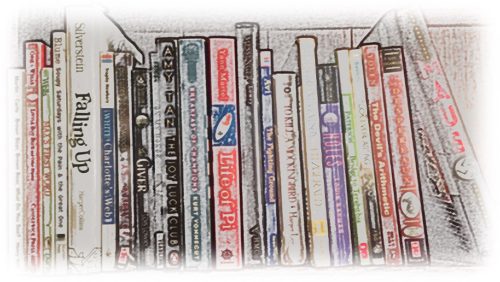
Book Talk
Igniting Passion in Readers of All Ages
I Am Enough
Grace Byers
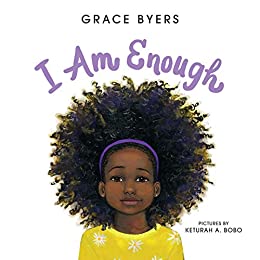 Actress, author, and activist Grace Byers has collaborated with illustrator Keturah A. Bobo in a beautiful two book series that includes I Am Enough and I Believe I Can. Both books center on the important theme of self-affirmation while emphasizing the traits of strength and compassion: “Like the champ, I’m here to fight. Like the heart, I’m here to love.” Through the different sets of comparisons, young readers will understand and respect their own unique personalities.
Actress, author, and activist Grace Byers has collaborated with illustrator Keturah A. Bobo in a beautiful two book series that includes I Am Enough and I Believe I Can. Both books center on the important theme of self-affirmation while emphasizing the traits of strength and compassion: “Like the champ, I’m here to fight. Like the heart, I’m here to love.” Through the different sets of comparisons, young readers will understand and respect their own unique personalities.
Clean Getaway
Nic Stone
 William and his grandma run away from home after William is suspended from school and consequently grounded by his father. William, affectionately called Scoob by his G’ma, initially looks forward to the adventure, but his grandma’s strange actions begin to worry him, especially when she cuts off all contact with William’s dad. As their strange journey continues, William starts to understand the complexities of the parent-child relationship.
William and his grandma run away from home after William is suspended from school and consequently grounded by his father. William, affectionately called Scoob by his G’ma, initially looks forward to the adventure, but his grandma’s strange actions begin to worry him, especially when she cuts off all contact with William’s dad. As their strange journey continues, William starts to understand the complexities of the parent-child relationship.
Not So Normal Norbert
James Patterson
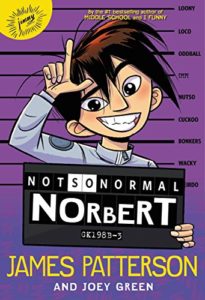
In this futuristic novel, Norbert is on a quest to find his parents who suddenly and without any notice leave him. One day at school, Norbert offends Loving Leader, the Earth’s dictator, by mocking him, and he is immediately sent to the planet Zorquat 3 with all of the other criminals. Once there, he discovers many other kids that are as unique as he is, and he enjoys the opportunities they have to further develop their interests and ideas in imaginative ways. While his search for his parents continues, Norbert begins to see the benefit of simply being himself.
The Beauty That Remains
Ashley Woodfolk
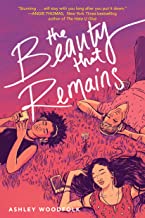 In this poignant novel, Woodfolk weaves together the lives of three teens through their common love of music and their recent experiences with tragedy. In rotating segments, readers hear the stories of Shay, Autumn and Logan, each trying to independently deal with the inevitable guilt and abandonment that accompanies the loss of a loved one. Eventually, their involvement with a local band, Unraveling Lovely, becomes part of their healing process, leaving readers with the strong message that grief is surmountable.
In this poignant novel, Woodfolk weaves together the lives of three teens through their common love of music and their recent experiences with tragedy. In rotating segments, readers hear the stories of Shay, Autumn and Logan, each trying to independently deal with the inevitable guilt and abandonment that accompanies the loss of a loved one. Eventually, their involvement with a local band, Unraveling Lovely, becomes part of their healing process, leaving readers with the strong message that grief is surmountable.
The Distance Learning Playbook
Douglas Fisher, Nancy Frey, and John Hattie
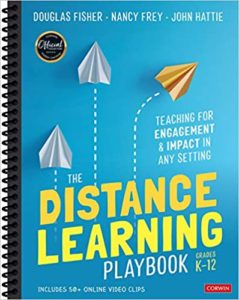 Authors Fisher, Frey and Hattie have produced a timely guide for educators navigating a new educational landscape. Set up in nine modules, the authors have included videos and other resources that focus on teacher-student relationships, fostering engagement in remote learning settings, planning units, delivering instruction, assessing students’ learning, and providing formative feedback. With insets from other educational experts, the playbook offers suggestions, examples, and sage advice for those teaching in hybrid and online settings.
Authors Fisher, Frey and Hattie have produced a timely guide for educators navigating a new educational landscape. Set up in nine modules, the authors have included videos and other resources that focus on teacher-student relationships, fostering engagement in remote learning settings, planning units, delivering instruction, assessing students’ learning, and providing formative feedback. With insets from other educational experts, the playbook offers suggestions, examples, and sage advice for those teaching in hybrid and online settings.
Connecting with Students Online
Jennifer Serravallo
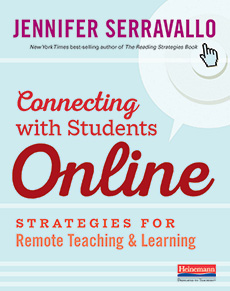 Much like The Distance Learning Playbook, Jennifer Serravallo has written a relevant guide to teaching online, which is a new practice for the majority of K-12 teachers. While many of the chapters echo Fisher et al.’s Playbook, in Chapter 2, Serravallo examines the need to work collaboratively with caregivers and parents, especially as students move to fully online instruction. By sharing the learning plans with parents, teachers better enable them to guide their children, many of whom, like their teachers, are experiencing this format for the first time.
Much like The Distance Learning Playbook, Jennifer Serravallo has written a relevant guide to teaching online, which is a new practice for the majority of K-12 teachers. While many of the chapters echo Fisher et al.’s Playbook, in Chapter 2, Serravallo examines the need to work collaboratively with caregivers and parents, especially as students move to fully online instruction. By sharing the learning plans with parents, teachers better enable them to guide their children, many of whom, like their teachers, are experiencing this format for the first time.
📚 Looking for authentic book recommendations about Native peoples? The American Indians in Children’s Literature site includes links to yearly book awards, tips for teaching about American Indians, and several other resources for educators.
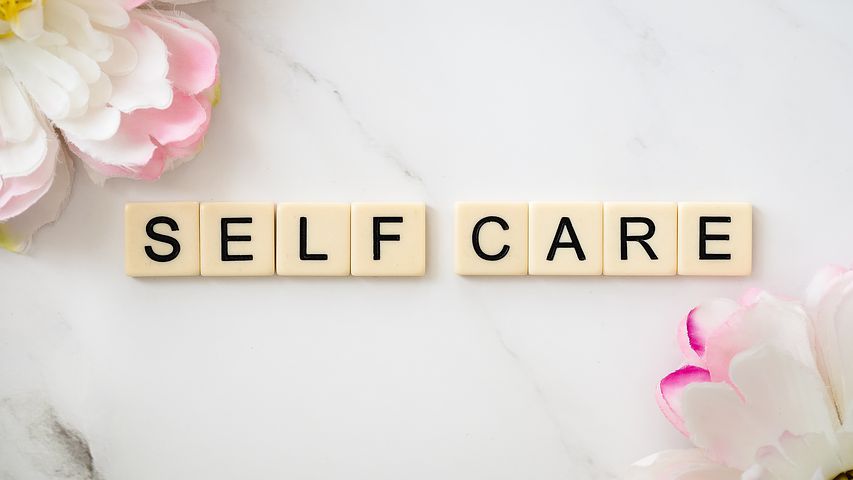
The Importance of Self-Care
For nearly seventy years, the concept of self-care has been promoted by healthcare professionals and various authors/media outlets. While its application over time may have had different areas of emphasis, such as those suffering from post-traumatic stress disorder or various forms of oppression, the current context, exacerbated by the pandemic, has pushed this need to the forefront. In The Distance Learning Playbook, leading educational experts Douglas Fisher, Nancy Frey, and John Hattie begin with Module 1: Take Care of Yourself. Many experts have relied upon the analogy of air travel with small children; Fisher et al. quote colleague Ricky Robertson who urges us to “put [our] oxygen mask on first before helping others” (2020). The authors also include the thoughts of instructional coach Claudia Readwright; she describes self-care through the lens of four focus points: health, love, competence and gratitude (Fisher et al., 2020). Each day, if possible, we can look at how these four areas allow us to spend a little needed time nurturing ourselves. We can ask questions like:
Health: What am I doing to take care of my physical well-being?
Love: What am I doing to nurture the important relationships in my life?
Competence: What am I doing to develop the skills necessary to do teach/coach/lead?
Gratitude: How and to whom have I demonstrated thankfulness?
By asking these seemingly simple questions, we attend to our physical and emotional needs, and we renew and fortify ourselves. They also allow us to self-assess. If we regularly give up time to exercise or sleep, we know that we need to focus our attention on our physical health.
While taking care of ourselves seems to state an obvious truth, according to Psychology Today, most of us overlook this and instead focus on the myriad stressors in front of us each day, such as work, family, community, politics, economics, and more. In addition, Dr. Davis explains that “we can sometimes feel guilty about taking the time required to take care of ourselves” (2018). Yet, failing to take that time, however short, puts us at a deficit that continues to build the more we ignore our bodies, minds, and hearts. Thus, whether to we look for self-care tips and strategies online or in a book, there are some simple commonalities, as outlined in the four focus areas previously stated. While they make take a little time out of our day, they are minutes or hours well spent. If we take time to simply walk and revel in the beauty of a Michigan fall, the work will wait, but we will come back to it with renewed energy. The Mayo Clinic has even created a set of “self-care tips during the COVID-19 pandemic.” They caution that if we find ourselves struggling with our feelings or our ability to concentrate, we most likely need to pause and take time to reassess It is quite true that we are less able to assist others if we have not first attended to our own needs, and while we can make excuses as to why we cannot afford the time to exercise or spend a day with loved ones, we must remind ourselves that in the long run, those opportunities balance us and make us whole.
Noteworthy News
The Wayne County Coaching Network supports over 100 literacy coaches through regular opportunities to study research-supported best practices in coaching and to hone their coaching skills and dispositions. If you are a literacy coach and are interested in joining this network, please take a minute to fill out this form. Registration is free.
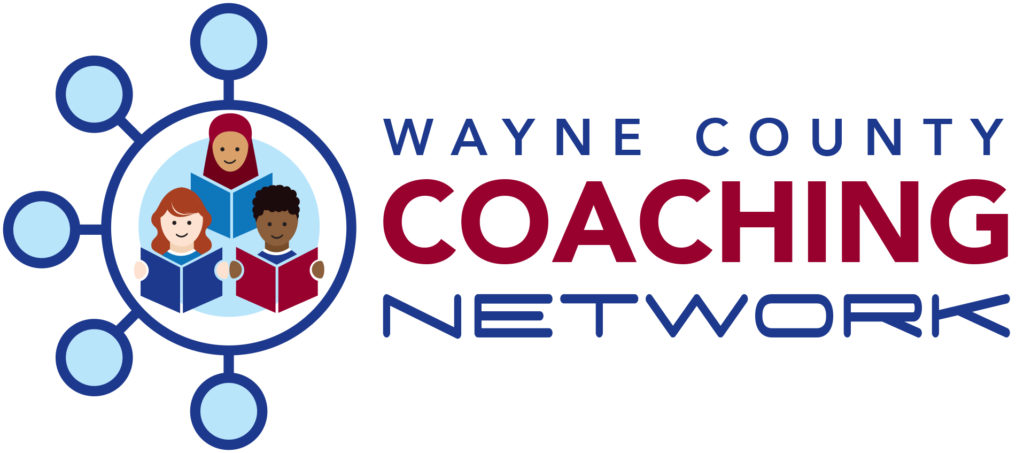
Professional Learning
| Upcoming Events at Wayne RESA |
| See the Professional Growth pages on the Wayne RESA site for links to course offerings, their descriptions, and online registration in Learning Stream. All professional learning sessions will be provided virtually until December 31, 2020. At that time, Wayne RESA will reevaluate delivery platforms that ensure the health and safety of our presenters and participants. If the registration for an event does not indicate an alternative plan for professional learning prior to December 31, please contact any of the Literacy Team members for updated arrangements. |
| Elementary |
| Leveled Literacy Intervention, K-2: December 1 – 2 and March 9 (all three dates online) OR February 1 – 2 and April 14 |
| The Fountas and Pinnell Leveled Literacy Program System (LLI) is a scientifically-based early intervention program designed to prevent literacy difficulties before they turn into long-term challenges. Participants will learn effective small group instructional strategies to provide the intensive support necessary for some primary students to achieve grade level competency in reading and writing. This program also specifically supports the unique needs of English Language Learners. This three-day workshop series will be led by Heinemann Literacy Consultant Dale Severyn, who will share her expertise as a reading specialist and certified Reading Recovery teacher leader. Enrollment in this series is limited to 30 participants, so early registration is recommended. Participants must bring to each session an orange, green, or blue LLI grade level kit (not included in this series). The target audience for this workshop is K-2 Teachers and Literacy Interventionists. For additional information, contact Debbie Reeves. |
| Leveled Literacy Intervention, Grades 3 – 5: December 8 – 9 and March 10 |
| The Fountas and Pinnell Leveled Literacy Program System (LLI) is a scientifically-based early intervention program designed to prevent literacy difficulties before they turn into long-term challenges. Participants will learn effective small group instructional strategies to provide the intensive support necessary for some intermediate students to achieve grade level competency in reading and writing. This program also specifically supports the unique needs of English Language Learners. This three-day workshop series will be led by Heinemann Literacy Consultant Dale Severyn, who will share her expertise as a reading specialist and certified Reading Recovery teacher leader. Enrollment in this series is limited to 30 participants, so early registration is recommended. Participants must bring to each session a red, gold, or purple LLI grade level kit (not included in this series). The intended audience for this series is grades 3-5 teachers and Literacy Interventionists. For additional information, contact Debbie Reeves. |
| Overview of the K-5 GELN Literacy Essentials: January 25 [Registration coming soon!] |
| Have you heard the phrase “minimum standard of care?” Are you familiar with how this phrase connects with literacy practices in our K-5 classrooms? If you are curious about these questions and how it can impact your teaching, then this session is for you! Come and learn about the GELN Essential Practices in literacy. In this session, participants will be provided an overview to the K-3 and 4-5 Literacy Essential Practices. Participants will spend time learning about motivation and engagement and the critical role these plays in all aspects of literacy development as well as the other 9 essentials. As each of the 10 essentials is introduced, participants will be given time for reflection and action planning; therefore, school literacy teams and/or grade level teams are encouraged to enroll together. This session could serve as a springboard to build ideas for professional learning linked to school improvement. All participants will receive their own printed copy of the GELN Literacy Essentials for Grades K-3 & 4-5. The intended audience for this session is K-5 teachers, reading specialists, literacy coaches, leadership team members, resource room teachers and grade level/school teams. (This session will focus on K-3 and 4-5 Essential Literacy Practices #1-10.) For additional information, contact Bridget Regan. |
| Storytelling with Digital Media: March 22 |
| Makerspaces encourage teachers to develop interactive opportunities for students as they develop products for a wide range of purposes and audiences. In this workshop, participants will discover ways to inspire active storytellers through digital media that tap into multiple literacies to create meaning. Participants will explore green screens and stop animation, e-book creations, and more. All participants will receive a stop animation starter kit and The Green Screen Maker Space Project Book. The intended audience for this course is K-12 educators. For additional information, contact Laura Gabrion. |
| Secondary |
| Creating Context for Teaching Night: May 10 |
| In collaboration with the Holocaust Museum, Wayne RESA proudly presents Creating Context for Teaching Night by Elie Wiesel. Participants in this course will explore the following learning outcomes: learn how to prepare students to read and understand Night within the larger historical framework of the Holocaust, examine the history of antisemitism to provide context before students read Night, examine Jewish life in Eastern Europe to provide cultural context for Night, explore the use of multimedia assets including using visual history testimonies and other primary sources and materials to support the effective teaching of Night, and discuss and identify themes, life lessons and the current relevance of Night. For additional information, contact Rosalyn Shahid. |
| Teaching Anne Frank in the ELA Classroom: Context, Choice, and Meaningful Action: April 14 |
| In collaboration with the Holocaust Museum, Wayne RESA proudly presents Teaching Anne Frank in the ELA Classroom: Context, Choice, and Meaningful Action. Participants in this course will explore the following learning outcomes: Understand the historical context within which Anne Frank and her family were living, develop a rationale for teaching Anne Frank, use resources and strategies to meet the unique challenges that arise when teaching Anne Frank that can be used to effectively and responsibly teach about the Holocaust, think critically about complex issues and ideas, understand the importance of choice and responsibility, and learn about different ways of taking meaningful and informed action. The intended audience for this course is language arts and social studies teachers. For additional information, contact Rosalyn Shahid. |
| Coaching |
| Building Coaching Strategies: Entering Into the Conversation: January 25, January 28, and February 10 |
| In this learning series, coaches will explore their current beliefs and how those beliefs might facilitate or debilitate the relationship with a teacher. This training will provide the coaches with knowledge, skills, and dispositions to shift teachers’ thinking from responding, “This is how we have always done it” to considering new possibilities. Coaches will acquire a vast knowledge of effective coaching skills to mediate the thinking of the teachers they coach. This will enable the teachers to think deeply about their practice and to monitor and adjust as necessary. Coaches will understand the link between effective coaching and the transformation of teacher practice. The intended audience is instructional coaches and literacy specialists, though it is appropriate for anyone in an instructional coaching role. For additional information, contact Laura Gabrion. |
| District Leadership |
| Essential School-Wide Practices in Literacy for Leaders: February 11-12, May 1 and May 15, OR May 12-13 |
| This workshop examines how literacy leaders can use their megaphone to advocate and implement organizational practices that create equitable literacy learning for all. This 2-day series will help district literacy leadership teams and building leaders strengthen the organizational practices necessary to ensure that equitable literacy practices are maintained system-wide. The MAISA GELN Essential School-Wide and Center-Wide Practices in Literacy will serve as the guiding document, and the series will include training on effective application of the School-Wide Screener as a driver for systematic change. By the end of the series, participants will have thoughtful, specific, and informed plans for improving literacy instructional support in their schools and throughout the community to reach EVERY child! The audience for this workshop includes individuals and building/district literacy leadership teams committed to the implementation of evidence-based, high quality literacy learning across the learning environment. For additional information, contact Michelle Wagner. |

Resources: Where can I find...
Wakelet is an easy-to-use, collaborative application for sharing media collections or resources. Users can link articles, videos, text, and more on a particular topic, and collections can be shared with others via QR code, link, or social media.
Sharing links, especially through video conferencing platforms, can be difficult at times. Many free programs are available for creating a QR code, such as QR Code Generator.
Wayne RESA Literacy Team
Meet Mellissa Wilson

Mellissa Wilson comes to Wayne RESA from Lenawee ISD where she worked as a Curriculum Consultant. Mellissa has been a contributing member of the MAISA GELN Early Literacy Task Force since its inception, and in that capacity, she has been instrumental in the promotion of professional learning that supports implementation of the Essential Instructional Practices in Early Literacy. She has brought a wealth of expertise to Wayne RESA, including the establishment of the Lit Lab Pop-Ups, a summer literacy initiative that provides students and their families with regular access to reading, writing and making opportunities during the summer months. Mellissa is currently the Secretary of the Michigan Reading Association’s Executive Board, a member of the Board of Directors for the Michigan ASCD, and a lead coordinator for the Wayne County COSA Initiative.
We look forward to hearing from you!
Laura Gabrion
Debbie Reeves
Bridget Regan
Rosalyn Shahid
Mary-Lu Strimbel
Mari Treece
Michelle Wagner
Colleen Whalen
Mellissa Wilson
If this newsletter has been forwarded to you, and you’d like to subscribe to it, please contact Laura Gabrion.
![]() 33500 Van Born Road • Wayne, MI 48184 • 734.334.1300 • 734.334.1620 fax • www.resa.net
33500 Van Born Road • Wayne, MI 48184 • 734.334.1300 • 734.334.1620 fax • www.resa.net
Board of Education
James S. Beri • Mary E. Blackmon • Danielle Funderburg • Lynda S. Jackson • James Petrie
Randy A. Liepa, Ph.D., Superintendent
“Use Your Megaphone”: Inspiring Excellence in Literacy Instruction Read More »